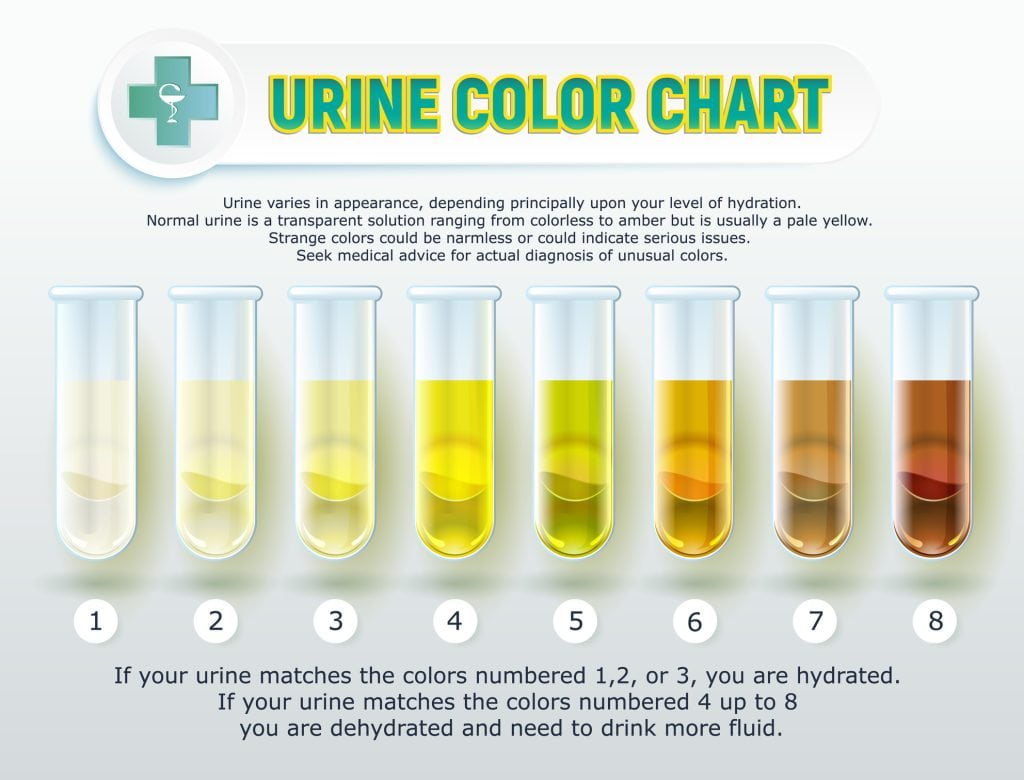What You Should Know About Your Urine Color And When to see a Doctor

Vector illustration of a visual poster: Urine Color Chart.
The colour of urine is what everybody needs to know because everybody pees adults, adolescents, kids, even toddlers. Your urine is a mix of water, electrolytes and waste that your kidneys filter out from your blood. The colour of your urine can change for many reasons. These can range from the food you eat, to the medicines you take, to certain medical conditions.
Urine has been a useful tool of diagnosis since the earliest days of medicine. It can tell a lot about what’s going on in your body, from how hydrated you are to whether you might have a urinary tract infection.
What You Should Know About Your Urine Color And When to see a Doctor
Clear urine (clear as sweat)
It means you might have:
Taken excess fluids (overhydration).
Kidney Problem or diabetes (under-hydration)
As a general rule of thumb, it’s usually a good sign for your health when the colour of your urine is a pale shade of yellow or clear. Urine that occasionally looks clear is no reason to panic, but urine that’s always clear could indicate that you need to cut back on how much water you’re drinking. Although hydration is good, drinking excess water when you’re already well-hydrated can make you lose electrolytes from your body.
What if your urine is clear and you’re not drinking enough water? That may signal an underlying kidney problem or diabetes. In this situation, it’s best to see a doctor to get answers.
Light yellow (amber urine)
It means you might have:
Drunk enough water and your body is well-hydrated.
This is the NORMAL COLOUR of the pee of most healthy individuals!
The colour of “typical” urine falls on the spectrum of light yellow to a deeper amber colour. This is because the urochrome pigment that’s naturally in your urine becomes more diluted as you drink water. Urochrome is produced by your body breaking down haemoglobin, the protein that carries oxygen in your red blood cells.
Continue drinking water at the current amount. No need to increase or decrease.
Dark yellow urine
It means you might have:
Taken excess B vitamins
Been dehydrated e.g. when more than 8 hours have passed since your last drink of water.
When you observe this colour, your body is telling you to drink more water. Basically, your urine is a more concentrated mix due to a lower-than-needed level of fluid in your system. This can happen if you’ve been outside sweating on a hot day or just finished a workout. Having a lot of B-vitamins in your bloodstream can also cause this colour of urine to appear. Food such as beef, spinach, legumes, milk, etc are rich in Vitamin B.
Drink some water, limit dehydrating foods/drinks e.g. soda, & check the medications you’re taking. More so, if rehydrating doesn’t lighten up your urine, see your doctor.
Light pink/bright red urine
It means you might have:
Eaten reddish foods e.g. blueberries
Taken pills e.g Rifampicin
Blood in your pee (haematuria) due to
– prostate problems
– kidney stones
– bladder or kidney cancer, etc
Your urine may look red or pink if you eat fruits with naturally deep pink or magenta pigments such as blueberries, beetroots, etc. Some health conditions can also cause blood to appear in your urine, a symptom known as hematuria, including enlarged prostate, kidney stones, tumours in the bladder and kidney. Some medications may turn your urine a reddish or pink hue.
In any case, see your doctor for a possible evaluation.
Orange urine
It means you might have:
Dehydration
Taken multivitamins
Eaten yellowish foods e.g. carrots
Urinary infection (UTI)
Often orange colored urine could mean the body needs water as you are dehydrated.
Orange colored urine may mean that bile may be getting into your bloodstream because of issues with your bile ducts or liver. Adult-onset jaundice can also cause orange urine.
Medication and some food consumed can also cause that.
What you should do is drink water and still see a doctor.
NB: If you have light-colored poop also, it may indicate a problem with your liver or bile.
Dark brown or cola-coloured urine
It means you might have:
Severe dehydration
Done excess exercise
Taken drugs like phenytoin, Flagyl, chloroquine, etc
Eaten fava beans, aloe, or rhubarb
Liver or kidney problems.
In most cases, urine that’s dark brown indicates intense dehydration due to excess exercise and other activities that cause loss of water. When your urine is dark because of exercise, it’ll typically resolve with some rest within a few hours.
A dark brown colored urine also could be caused by bile getting into your urine, a sign of liver disease.
If you frequently see dark brown urine after exercise, or if your urine doesn’t return to normal after 48 hours, you should speak with a doctor about possible underlying causes.
Green/blue urine
Blue- or green-tinged urine can be caused by:
Food colouring
Dyes used in certain kidney and bladder tests
Certain medications and supplements, such as indomethacin, amitriptyline, propofol, and some multivitamins.
Blue diaper syndrome (familial benign hypercalcemia) a disorder in which children have blue urine.
An infection in your urinary tract caused by the bacterium Pseudomonas aeruginosa
See a doctor for possible checks.
Purple urine
It might be due to a medical condition called Porphyria – a rare blood disorder that shows there is a problem with the liver.
Cloudy or foamy urine
This is a medical condition that should be treated as soon as possible..
Urinary tract infections and kidney stones can cause urine to become cloudy. Once again, too, dehydration also could be the culprit.
For a woman, If you have cloudy urine and you’re pregnant, it could be a sign of a dangerous condition called preeclampsia.
Foaming urine also could indicate excess protein in your diet or a kidney problem
Drink plenty of water and call your doctor if the symptoms persist.
Conclusion
Your urine color often depends on 5 things:
• Quantity of water you drink
• The medications you’re taking
• What you eat
• Disease conditions
• Exercise
Most disease associated with urine colours are kidney and liver problems.
READ: If You Don’t Want Cockroaches In Your Home, Do These Easy Things
You should be concerned if the colour of your pee is significantly abnormal and see a doctor as fast as you can.
Send Stories | Social Media | Disclaimer
Send Stories and Articles for publication to [email protected]
We Are Active On Social Media
WhatsApp Channel: JOIN HERE
2024 BECE and WASSCE Channel - JOIN HERE
Facebook: JOIN HERE
Telegram: JOIN HERE
Twitter: FOLLOW US HERE
Instagram: FOLLOW US HERE
Disclaimer:
The information contained in this post on Ghana Education News is for general information purposes only. While we endeavour to keep the information up to date and correct, we make no representations or warranties of any kind, express or implied, about the completeness, accuracy, reliability, suitability or availability with respect to the website or the information, products, services, or related graphics contained on the post for any purpose.



 Odomase sub chief donates US$2,000 worth computers to alma mater
Odomase sub chief donates US$2,000 worth computers to alma mater  Otumfuo Osei Tutu II Foundation collaborates with Newmont Ghana to build Artificial Intelligence Center at Kona
Otumfuo Osei Tutu II Foundation collaborates with Newmont Ghana to build Artificial Intelligence Center at Kona  Esther Cobbah elected President of Institute of Public Relations, Ghana
Esther Cobbah elected President of Institute of Public Relations, Ghana  Dear GES, Adenta Community Basic School Is a Death Trap Constantly Shaking
Dear GES, Adenta Community Basic School Is a Death Trap Constantly Shaking